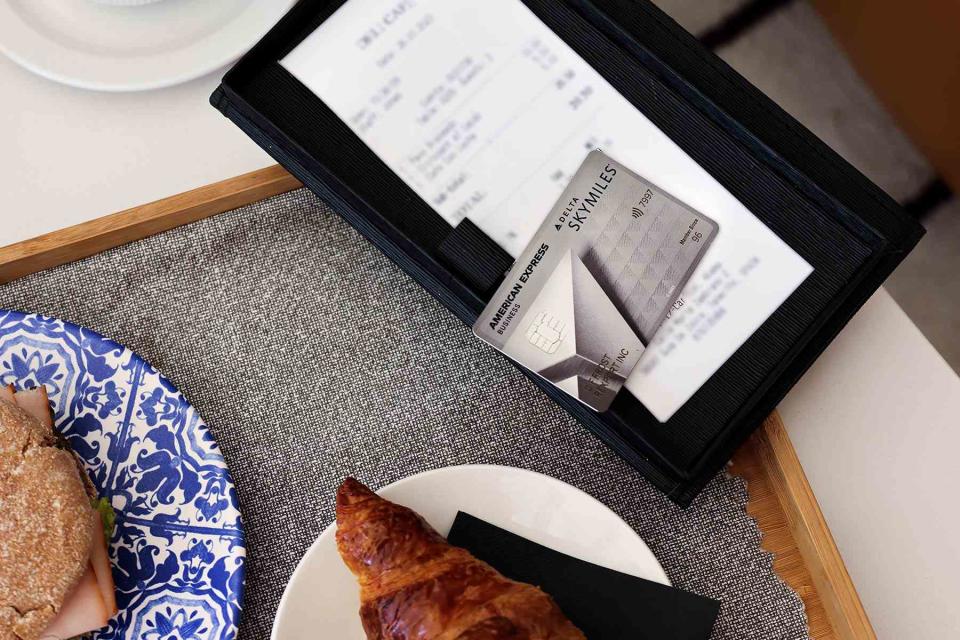Delta Amex Cards Are Getting Some New Perks — and a Higher Annual Fee
Are the new benefits worth the higher cost?

Courtesy of American Express
Delta’s American Express cards are getting a facelift with new lifestyle and travel-related credits — but unfortunately with the new perks comes higher annual fees.
Currently, there are three tiers of Delta personal and business credit cards: Gold, Platinum, and Reserve. Here’s a preview of the new membership fees, which will take effect on May 1:
Delta Gold: $150 annual fee, previously $99
Delta Platinum: $350 annual fee, previously $250
Delta Reserve: $650 annual fee, previously $550
So, are the new benefits worth the annual fee increases?
Starting with the introductory level, the Delta Gold personal and business cards will get a new $100 annual credit for Delta Stays, which is the airline’s version of hotel and rental car bookings. Delta Gold cardholders can also earn a $200 Delta flight credit after spending $10,000 annually.
The mid-level Delta Platinum cards are receiving a bundle of credits, totaling nearly $400 per year. Delta Platinum cardholders can receive a $120 Resy credit, $120 rideshare credit, and $150 Delta Stays credit.
Finally, the Delta Reserve cards are the airline’s most premium products dedicated to its ultra-loyal flyers. Delta Reserve cardholders will receive a $240 Resy credit, $120 rideshare credit, and $200 Delta Stays credit, for a total of $560 in annual statement rebates.
"These new benefits not only help our members on their journey to status, but they also provide tangible benefits both in the air with us and on the ground in their everyday lives,” said Delta’s senior vice president of customer engagement and loyalty and chief executive officer of Delta Vacations, Dwight James, in a statement. “Through the new MQD Headstart value — along with MQD Boost, the expanded Companion Certificate and new statement credits — these cards remain a great way to enjoy elevated experiences with Delta Air Lines and American Express.”
It’s important to note that the Resy and rideshare credits are use-it-or-lose-it benefits, doled out in monthly increments. For example, the $120 rideshare credit would be distributed in $10 increments per month and won’t roll over.
In addition, the Delta Platinum and Reserve cards come with annual companion certificates that act as a BOGO ticket, saving lots of money for travelers. Previously only usable for the 48 contiguous U.S. states, Delta says these certificates are now valid to new destinations, including “Alaska, Hawaii, Mexico, and the Caribbean.”
To kick off the new changes, Delta’s cards offer limited-time welcome offers of up to 110,000 bonus miles after meeting minimum spending requirements.
This isn’t the first time Delta made sweeping changes to its family of airline cards. In February 2023, Delta introduced a cardholder-exclusive benefit known as “TakeOff 15,” which offers a 15 percent discount when redeeming flights with SkyMiles.
The new card benefits also come just a few months after Delta announced major changes to its loyalty program, as Medallion Qualification Dollars (MQDs) are the only qualification metric for elite status. Delta’s top-tier Platinum and Reserve products come with a headstart of 2,500 MQDs, but now travelers must decide if it’s worth forking over significantly higher card fees.
In the same year, Delta announced that it would start to restrict Sky Club lounge access for top-tier Reserve cardmembers effective Feb. 1, 2025. This policy still remains in place, as access policies for Delta Reserve personal and business cards will change from unlimited visits to 15 capped lounge visits starting next year.
For more Travel & Leisure news, make sure to sign up for our newsletter!
Read the original article on Travel & Leisure.

